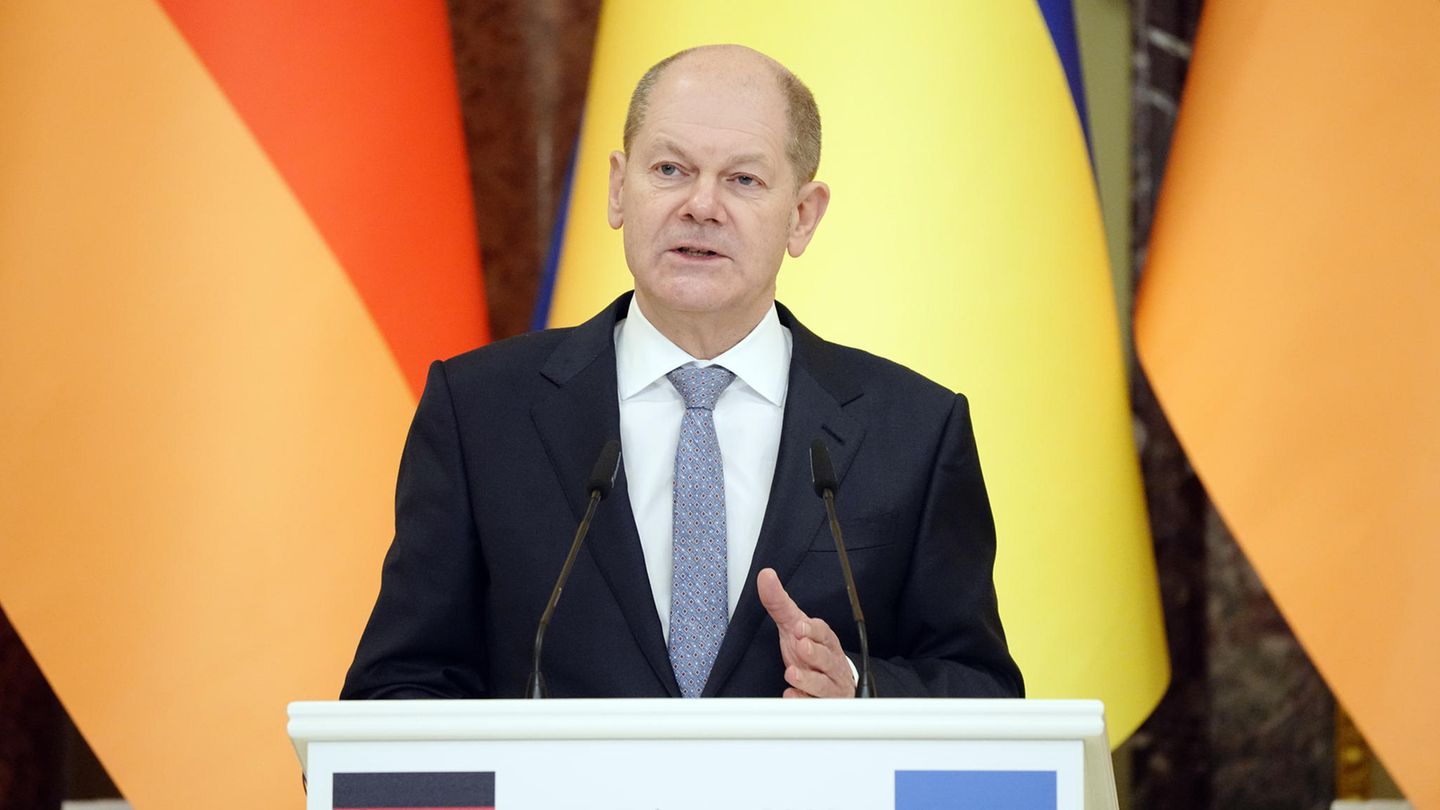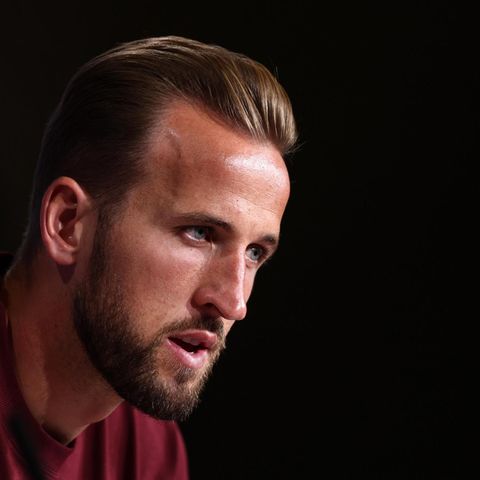press reviews
Olaf Scholz started his first visit to the East in the Ukraine. There he promised his counterpart solidarity and financial support. But commentators ask themselves, “Can war still be averted?”
On Monday, Germany’s Chancellor Olaf Scholz went to the Ukrainian capital of Kiev for his inaugural visit. He promised his counterpart Volodymyr Zelenskyj financial support – but no weapons. And the German Chancellor addressed warning words to Russia. Should Putin and his troops violate Ukraine’s integrity, the West would know what to do.
In this tense situation, the press asks itself one question above all: Was it enough to prevent a war? The media coverage at a glance.
Visit by Olaf Scholz: bitter disappointment for Ukraine?
“Stuttgart Newspaper”: “Many Ukrainians only endured the visit of Chancellor Olaf Scholz with clenched fists in their pockets. Berlin swears by the noble claim of a value-based foreign policy. At the same time, the governments under Gerhard Schröder, Angela Merkel and now Olaf Scholz always look to cronies with Russia, which is rich in natural resources The keywords are: Nord Stream II, rejection of Ukraine’s NATO membership, avoidance of an EU perspective. In view of this history, the Ukrainians find it difficult to bear it when Scholz talks about solidarity in Kiev.”
“Reutlingen General Gazette”: “German fig leaf policy: Chancellor Olaf Scholz practices classic German checkbook diplomacy. Germany will not supply Ukraine with weapons, but there is money for them. What Ukraine does with them ultimately plays no role and cannot be controlled German partners. Ukraine again demanded weapons: 12,000 anti-tank missiles and 1,000 anti-aircraft missiles. Referring to German legislation on arms exports to crisis areas, Scholz refused, although at the same time he warned of a very serious threat to peace in Europe. The question arises: Will Germany maintain this stance if Ukraine is actually attacked?”
“Rhine Palatinate” (Ludwigshafen) Nothing. That Scholz will go down in history as the one who “stopped” Putin during his visit to the Kremlin on Tuesday can also be ruled out. No matter how determined he is for the umpteenth time in conveying any threats of sanctions. The only one that counts for Putin “, is Biden (…). On the basis of Foreign Minister Lavrov’s displayed recommendation not to continue negotiations, one should not give too much. Moscow will weigh up coolly whether the threat shown is sufficient for the time being. The mere fact that Putin is believed capable of the invasion makes the Ukrainians NATO membership impossible for the time being.”
“Badisches Tagblatt”: “Kiev is likely to be a bit disappointed by the chancellor’s public statements. One would have wished for it to be a little clearer. As in Washington, Scholz did not put the word Nord Stream 2 in his mouth despite demand, he also squirmed on the subject of arms deliveries, and only promises a re-examination of the Ukrainian wish list. Perhaps he was more accommodating in direct talks with Selenskyi than on the outside. Overall, Scholz is right with the dual strategy: resolutely threatening sanctions against Russia and at the same time being willing to talk. That’s more The order of the day. There are a lot of compromise lines, the channels of conversation are open, it’s now a matter of using them. If Scholz can persuade Putin to make concessions in Moscow today, the federal government’s crisis management was worth it. It got going late. But maybe not too late.”
Does Putin really have the upper hand?
“Munich Mercury”: “Can war still be averted? If things go badly, then Chancellor Scholz was the last Western head of state to visit Kiev in peacetime. But the window for negotiations has not yet closed completely. It’s possible that Putin has lost his way and himself The stakes are also high for the seemingly all-powerful Russian president, who has made it clear to him that if he decides to attack against the advice of many of his former generals, he will pay a horrendous price: economically “Politically, but also militarily. Because the huge Ukraine is easier to overwhelm than to occupy permanently. The country threatens to become a graveyard for many Russian soldiers. This is dangerous for the ruler for life. After all, the whole Ukraine maneuvers served before All with the purpose of unleashing a new Putin euphoria at home, as was the case in Crimea.”
“General newspaper”: “No, the West hasn’t given up on Ukraine and it won’t allow itself to be blackmailed, not even with a large number of soldiers. It’s up to Russia to take a step back. Negotiations can then very well take place – about security interests “Arms control, a limit on troop deployments and, yes, the status of Ukraine. Russia can certainly hope for something from that. If the tanks roll, Putin’s empire will become an international pariah.”
“Handelsblatt”: “Putin’s calculus was clear from the start: he fantasized about a threat scenario from NATO, made unachievable demands on the West, and then used the failed talks as a pretext for escalation. On the one hand, the president wants to return to the Yalta world of yesteryear Century, wants to loosen Central Europe from its Atlantic anchoring and back to the principle of zones of influence. On the other hand, he wants to move forward into the disorder of the 21st century – in which one thing counts above all: military strength and national unity. Whether he is on the way to this new world will actually risk an invasion of Ukraine in the end? Putin may not even know that himself at the moment. But the risk is there – which is why from the West’s point of view there can only be one strategy: to drive the price up as high as possible.”
“The New Day” (Weiden): “In the capitals of Europe and in Washington, it is known that Russian President Vladimir Putin is currently in control. Not a good omen for Chancellor Olaf Scholz’s (SPD) inaugural visit to Moscow. It is a trip to the Cold. The stop in Kiev on Monday is an important signal, but what Scholz says in the Kremlin on Tuesday is crucial. The Chancellor must make it clear that Germany is willing to free itself from dependence on Russian gas supplies if necessary. Scholz must Angela Correct Merkel and Gerhard Schröder.”
“OM Media”: “Rationally speaking, the troop movements are an economic catastrophe for the weak Russian state budget. Every day, the military operations swallow up huge sums of money. If Putin wanted to act economically, then his troops would already be in Ukraine. So why didn’t he invade? Because Putin doesn’t have one either Interested in military escalation. There is a lack of money. But he creates the potential for blackmail. Russian diplomacy has thought – often successfully – in “train by train”. Putin wants an open gas pipeline, the western world no more war rattling. How does Scholz negotiate? “
Source: Stern
David William is a talented author who has made a name for himself in the world of writing. He is a professional author who writes on a wide range of topics, from general interest to opinion news. David is currently working as a writer at 24 hours worlds where he brings his unique perspective and in-depth research to his articles, making them both informative and engaging.




